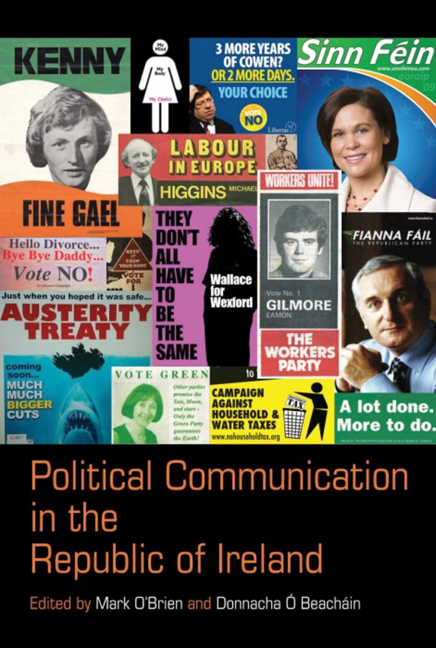Book contents
- Frontmatter
- Contents
- List of Illustrations
- Glossary
- Notes on Contributors
- Acknowledgements
- Introduction
- Part One Political Communication and Politicians
- Part Two Political Communication and Journalism
- Part Three Political Communication and the Public
- 9 A private affair? Lobbying and transparency in modern Ireland
- 10 Equal time for Judas Iscariot? Broadcast treatment of political contests in the Republic of Ireland
- 11 ‘There now follows …’: The role of the party political broadcast and the 2007 ‘peace broadcast’
- 12 Social media and political communication
- 13 Mediating elections in Ireland: evidence from the 2011 general election
- Conclusion
- Index
12 - Social media and political communication
from Part Three - Political Communication and the Public
- Frontmatter
- Contents
- List of Illustrations
- Glossary
- Notes on Contributors
- Acknowledgements
- Introduction
- Part One Political Communication and Politicians
- Part Two Political Communication and Journalism
- Part Three Political Communication and the Public
- 9 A private affair? Lobbying and transparency in modern Ireland
- 10 Equal time for Judas Iscariot? Broadcast treatment of political contests in the Republic of Ireland
- 11 ‘There now follows …’: The role of the party political broadcast and the 2007 ‘peace broadcast’
- 12 Social media and political communication
- 13 Mediating elections in Ireland: evidence from the 2011 general election
- Conclusion
- Index
Summary
The election of Barack Obama in 2008 was widely regarded as being an internet election victory. Greengard (2009, 16) described Obama as ‘the first internet president’ and there was widespread agreement amongst political commentators and digital media experts as to ‘how politicians and the public interact [would] never be the same.’ In the days following Obama's election, the New York Times reflected on the repetition of history in the effective use of a new medium: ‘One of the many ways that the election of Barack Obama as president has echoed that of John F. Kennedy is his use of a new medium that will forever change politics. For Mr Kennedy, it was television. For Mr Obama, it is the internet’ (Miller, 2008). Commentators, such as Huffington Post founder and editor-in-chief Arianna Huffington (2008) went further and believed that the Obama win was entirely due to his use of the Web: ‘Were it not for the Internet, Barack Obama would not be president. Were it not for the Internet, Barack Obama would not have been the nominee.’
But was Obama's win entirely down to successful use of the internet? Why did he win when, just four years earlier, Howard Dean had failed having used the same approach? One might assume that Barack Obama perfected Dean's trial use of internet technologies but it is also reasonable to suggest that such electronic communication had come of age and that the electorate was sufficiently comfortable with the technologies to engage with their preferred candidate. The Web had intrinsically changed between the presidential elections of 2004 and 2008 with the growth of Web 2.0 technologies, specifically the advent of social media. The revolution promised by Web 2.0 was based on participation and interactivity rather than the publication/ broadcast or one-way communication flow that had defined the Web up to then.
Whatever can be said about the medium itself, there can be little doubt that Obama's candidacy was particularly suited to the use of an interactive, two-way communication facility provided by Web 2.0 in general and by social media in particular. As a community organiser, Obama understood the potential of crowdsourcing – and not just for financial support, but for idea generation and policy support also.
- Type
- Chapter
- Information
- Political Communication in the Republic of Ireland , pp. 201 - 216Publisher: Liverpool University PressPrint publication year: 2014



